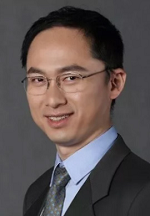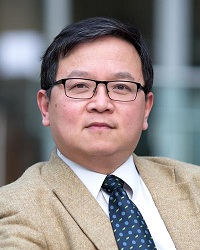CCL 2019特邀报告
(注:按照报告时间排序)
特邀报告1

报告人:何晓冬(京东AI研究院常务副院长、IEEE Fellow)
时间:2019年10月19日09:30-10:30
地点:世纪金源大饭店一楼宴会厅
题目:语言与视觉多模态智能的进展
摘要:基于近年来深度学习技术对语音,语言,视觉等子领域的推动,在语言和视觉跨模态交叉学科领域我们也取得了很多激动人心的进展,包括跨语言与图像的理解、推理和生成。具体而言,语言与视觉多模态智能的研究可分为多个层次,包括从底层的多模态表征学习,到上层的语言和视觉表征的融合与对应,再到更上层的应用比如图像描述、视觉问答、文字到图像合成等。同时各个层次的模型并不是万却独立,而往往是通过端到端的训练联合优化的。在报告中我将结合经典的语言与视觉多模态应用介绍跨语言和视觉的语义表示建模及跨模态信息融合。同时,我还将探讨多模态智能中的可解释性和可控性问题。最后,对多模态智能未来的突破进行了展望。
简介:何晓冬博士是京东人工智能研究院常务副院长,深度学习及语音和语言实验室的负责人。他还在华盛顿大学(西雅图)、香港中文大学(深圳)、同济大学、及中央美术学院任兼职教授和荣誉教授。在加入京东集团之前,他曾担任微软雷德蒙德研究院深度学习技术中心的首席研究员和负责人。他的研究主要集中在人工智能领域,包括深度学习,自然语言处理,语音识别,计算机视觉,信息检索和多模态智能。他与合作者在这些领域发表了100多篇论文,谷歌学术统计引用数超过13000次,并多次获得优秀论文奖及赢得重要的人工智能方面大赛。他与合作者发明的深层结构化语义模型(DSSM/C-DSSM),分层注意力网络(HAN),CaptionBot,SAN,AttnGAN,BUTD Attention等广泛应用于语言,视觉,IR和人机对话等任务。基于其在自然语言和视觉技术及多模态信息处理方面的贡献,他于2018年入选IEEE Fellow。
特邀报告2

报告人:陈为(浙大计算机学院副院长、国家万人计划领军人才)
时间:2019年10月19日10:30-11:30
地点:世纪金源大饭店一楼宴会厅
题目:可视化点亮唐诗宋词背后的大千世界
摘要:理解和利用数据是信息技术发展的迫切需求,数据可视化为人类洞察数据的内涵、理解数据蕴藏的规律提供了重要的手段和高效的人机界面,是和数据分析、数据挖掘等方法的有效补充,在一些重要场合将起到不可替代的作用。本次报告将介绍面向宋文化数据(宋词、宋人年谱、哈佛大学CBDB数据库)的可视化作品与系统,以技术、设计、文化三者角度介绍课题组在面向唐诗宋词文化大数据的可视化和可视分析的作品和软件。所介绍的系统支持人文研究者从人物的生平轨迹和不同生活年代的背景进行分析与对比, 探索不同年代、不同经历的文化作品在文本主题上的相关性与独特性. 并通过对文本的可视化与文本意象的关联分析,支持以多维度的视角去了解人物生平、关系以及时代背景。
简介:陈为,教授,浙江大学CAD&CG国家重点实验室副主任,浙江大学计算机学院副院长,入选中组部第四批万人计划(领军),十三五国家重点研发专项“云计算与大数据”专家组成员。研究兴趣是大数据可视分析。担任多个国际SCI期刊编委、多个国际重要学术会议主席。获省部级科技奖3次。个人主页:http://www.cad.zju.edu.cn/home/chenwei。
特邀报告3

报告人:张晓东(尼克) (《人工智能简史》作者、乌镇智库理事长)
时间:2019年10月20日08:30-09:30
地点:世纪金源大饭店一楼宴会厅
题目:人工智能:从历史看未来
摘要:人工智能已经有六十多年的历史,本报告从理论计算机科学的角度分析人工智能学术发展的几条主线,例如逻辑主义、联结主义和自然主义,力图梳理人工智能的潜力和边界。另外,报告将定量地看待自1980年代以来全球人工智能的产业变化,包括投资、创业、人才等维度,并探讨人工智能技术的落地应用,及其对经济、社会的影响。
简历:张晓东(尼克),国家特聘专家,乌镇智库理事长,北京数知科技股份有限公司首席战略官,中国人工智能最高奖吴文俊奖获得者。张晓东毕业于天津大学,中国科学院,美国麻省大学计算机系,并拥有MBA学位。早年在哈佛大学从事生物信息学研究,后在HP担任技术总监并负责全球第一个互联网支付项目。他是NoSQL概念的原创者之一,并拥有多项数据库技术专利。曾在硅谷连环创业,并曾担任VC合伙人和上市公司独立董事,也是多个国际标准化组织工作组的发起人。张晓东在哲学,科技,商业等领域均有论述,在《上海书评》、《中国计算机学会通讯》和《沪港经济》等期刊发表多篇专栏文章,著作包括《人工智能简史》(2017),《哲学评书》(2014)及《UNIX内核解析》(1990)。
特邀报告4

报告人:郭毅可(英国皇家工程院院士、欧洲科学院院士)
时间:2019年10月20日09:30-10:30
地点:世纪金源大饭店一楼宴会厅
题目:数据高效性机器学习
摘要:Recent advances of deep learning have been successful in delivering the state-of-the-art performance in medical image analysis, including lesion segmentation and classification. However, deep neural networks (DNNs) require a large amount of training data with high-quality annotation which are not available or expensive in the field of medical images. Moreover, black box deep learning algorithms are lack of interpretability and limit their application in medical diagnostics. In this talk, a series of our research will be introduced including 1) a data-efficient approach that integrates domain knowledge as a strong prior into deep learning framework for lesion segmentation task. 2) A boosting strategy on generating representative data samples for efficient training where training dataset is expanded and updated based on the current state of DNN in an active manner.
个人简介:英国皇家工程院院士、欧洲科学院院士、英国帝国理工大学教授、香港浸会大学副校长。帝国理工学院Data Mining Research Group及 Discovery Sciences Group的领导者,伦敦E-Science研究中心首席科学家,英国InforSense有限公司董事会主席兼首席执行官,上海生物信息技术研究中心客座教授兼首席科学家。郭教授在云计算、数据挖掘、生物信息学方面的研究处于全球领先位置。1985年本科毕业于清华大学计算机系,1986年硕士毕业于清华大学计算机系,1993年博士毕业于帝国理工大学计算机系,留校工作5 年后就取得了帝国理工计算机系教授的职位。郭毅可教授是清华大学计算机系IV-VENTURE客座教授,上海市首批千人计划入选者,也是中国计算机学会大数据专家委员会首批委员。
特邀报告5

报告人:季姮(伊利诺伊大学厄巴纳-香槟分校教授、NAACL2018程序委员会主席)
时间:2019年10月20日13:30-14:30
地点:世纪金源大饭一楼宴会厅
题目:How to Write a History Book?
摘要:Understanding events and communicating about them are fundamental human activities. However, it's much more difficult to remember event-related information compared to entity-related information. For example, most people in China will be able to answer the question "Which city is Tsinghua University located in?", but very few people can give a complete answer to "Who died in 1937 Nanjing Massacre?". Human-written history books are often incomplete and highly biased because "History is written by the victors". For example, the history textbooks used in Japanese schools barely mention details about the Nanjing Massacre, and even so contain a lot of false information. In this talk I will describe an ambitious ongoing project on automatic history book generation. We propose a new research direction on event-centric knowledge base construction from multimedia multilingual sources. Our minds represent events at various levels of granularity and abstraction, which allows us to quickly access and reason about old and new scenarios. Progress in natural language understanding and computer vision has helped automate some parts of event understanding but the current, first-generation, automated event understanding is overly simplistic since it is local, sequential and flat. Real events are hierarchical and probabilistic. Understanding them requires knowledge in the form of a repository of abstracted event schemas (complex event templates), understanding the progress of time, using background knowledge, and performing global inference. Our approach to second-generation event understanding builds on an incidental supervision approach to inducing an event schema repository that is probabilistic, hierarchically organized and semantically coherent. Low level primitive components of event schemas are abundant, and can be part of multiple, sparsely occurring, higher-level schemas. Consequently, we combine bottom-up data driven approaches across multiple modalities with top-down consolidation of information extracted from a smaller number of encyclopedic resources. This facilitates inducing higher-level event representations analysts can interact with, and allow them to guide further reasoning and extract events by constructing a novel structured cross-media common semantic space. When complex events unfold in an emergent and dynamic manner, the multimedia multilingual digital data from traditional news media and social media often convey conflicting information. To understand the many facets of such complex, dynamic situations, we have also developed cross-media cross-document event coreference resolution methods for information verification and disinformation detection. We then extract event-event relations and apply knowledge-driven natural language generation techniques to write event-centric history book chapters.
简历:Heng Ji is a professor at Computer Science Department of University of Illinois at Urbana-Champaign. She received her B.A. and M. A. in Computational Linguistics from Tsinghua University, and her M.S. and Ph.D. in Computer Science from New York University. Her research interests focus on Natural Language Processing, especially on Information Extraction and Knowledge Base Population. She is selected as "Young Scientist" and a member of the Global Future Council on the Future of Computing by the World Economic Forum in 2016 and 2017. The awards she received include "AI's 10 to Watch" Award by IEEE Intelligent Systems in 2013 and NSF CAREER award in 2009. She has coordinated the NIST TAC Knowledge Base Population task since 2010. She is the associate editor for IEEE/ACM Transaction on Audio, Speech, and Language Processing, and served as the Program Committee Co-Chair of many conferences including NAACL-HLT2018.
CCL 2019特邀报告PPT下载列表
| 序号 | 报告题目 | 报告人 | PPT下载 |
|---|---|---|---|
| 01 | |||
| 语言与视觉多模态智能的进展 | 何晓冬 | 语言与视觉多模态智能的进展.pdf | |
| 02 | |||
| 数据高效性机器学习 | 郭毅可 | 数据高效性机器学习.pdf |